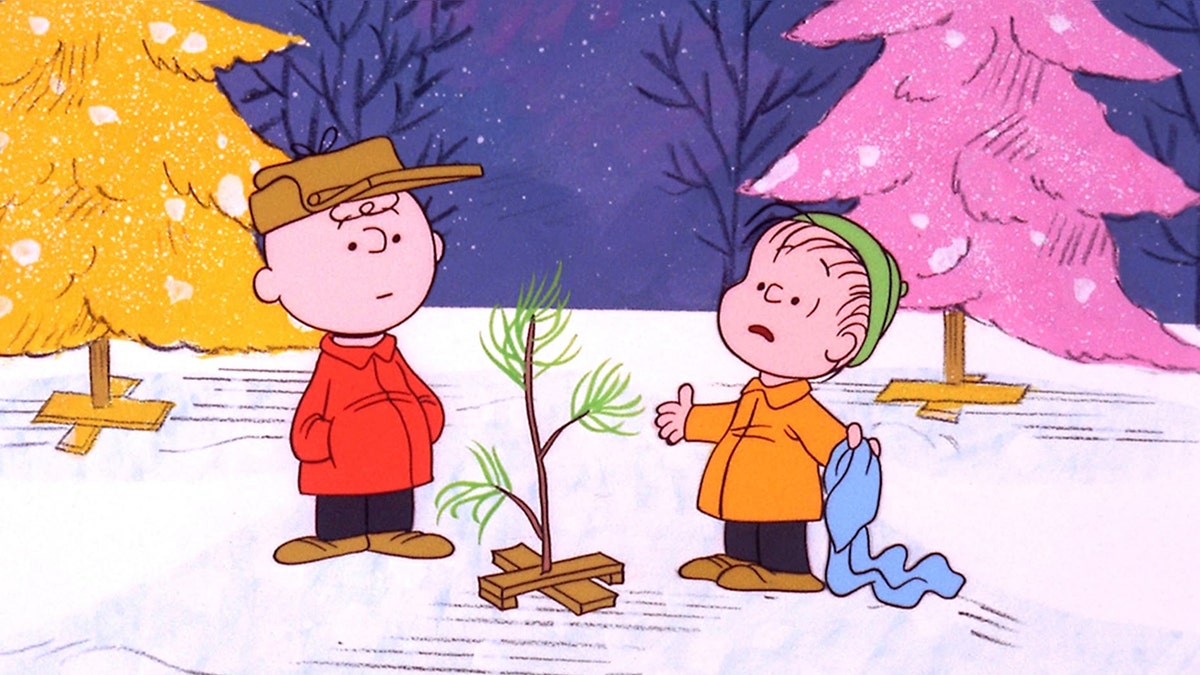NEWYou can now listen to Fox News articles!
For most Americans, the surfeit of shopping is indicative of a holiday season in full swing. Consumerism has become so synonymous with Christmas that it is nostalgic to remember that almost 60 years ago a holiday television special was broadcast which delivered a blistering broadside into the commercialization of Christmas.
In the beginning scenes of the special, a depressed Charlie Brown becomes ever more despondent as he meets his fellow Peanuts characters, all of whom seem obsessed with receiving gifts and money.
At Lucy’s psychiatric booth, the “doctor” tells her “patient” that she can relate to his feelings of depression during the holiday season explaining that the source of her sadness is that she never receives what she truly wants – real estate and cold hard cash!
ON THIS DAY IN HISTORY, DEC. 9, 1965, ‘A CHARLIE BROWN CHRISTMAS’ DEBUTS TO POPULAR ACCLAIM
Charlie Brown’s younger sister, Sally, dictates a letter to her older brother, asking Santa to “Just send money. How about tens and twenties?”
When Charlie Brown expresses his dismay, his sister protests, “All I want is my fair share!” Even Snoopy has “gone commercial” by overwhelming his dog house with a garish display of lights and ornaments to compete in a neighborhood Christmas lights contest which offers a money reward. (The bulbous-nosed beagle wins top honors.)

Charlie Brown shows are moving from television to Apple TV+. (Walt Disney Television via Getty Images)
“Look, Charlie, let’s face it. We all know Christmas is a big commercial racket,” Lucy tells a defeated Charlie Brown. “It’s run by a big eastern syndicate, you know.”
“A Charlie Brown Christmas” was, intentionally or not, something of a rebuke to “Rudolph the Red-nosed Reindeer,” which was broadcast one year earlier. The Rankin/Bass production not only embraced the Christmas mythology of Santa Claus, but it also enshrined a new secular superstar beside him… a luminous-nosed reindeer. Sponsored by General Electric, the hour-long program was stuffed with commercial advertising featuring the special’s characters hawking an unending list of G.E. wares – a cordless slicing knife, electric blanket, coffee maker, electric toothbrush, hair dryer, portable toaster oven, electric can opener, knife sharpener, vacuum cleaner… seemingly a home appliance for every quirky plaything on the Island of Misfit Toys.

Cartoonist Charles M. Schulz, creator of the “Peanuts” comic strip, draws in his studio near a stuffed Snoopy toy. (Getty Images)
CLICK HERE FOR MORE FOX NEWS OPINION
Charles Schulz, the cartoonist behind Charlie Brown and the Peanuts comic strip, made several other bold moves in producing his Christmas special for Coca-Cola, the show’s sponsor.
He refused to employ a laugh track. He insisted on using real children, not professional voice talent. He used jazz music for the soundtrack. And most importantly, and against the advice of his creative collaborators, Schulz insisted that his Christmas special include a message about the true meaning of Christmas.
The result was a one-minute soliloquy of Scripture by Linus, Schulz’s favorite character, heralding the birth of Christ. It is the special’s climactic scene and is presented unadorned without any background music.

Charles M. Schulz with a few of his Peanuts characters, including (on top of books) Lucy van Pelt and Charlie Brown, and below, from left, Linus (with blanket), Snoopy and Schroeder (at piano). Image dated Jan. 1, 1962. (CBS via Getty Images)
The CBS executives, who first screened “A Charlie Brown Christmas” just a week before its scheduled broadcast, were dismayed by what they saw. They had almost certainly expected another “Rudolph the Red-nosed Reindeer,” but instead of Santa Claus, reindeer, elves and traditional holiday music, they had been served up a buffet of Bible study, holiday angst and a searing attack on consumerism.
Linus’ recitation from the Gospel of Luke arrives like a thunderbolt of clarity, without a hint of foreshadowing and with only a one-sentence introduction – a veritable Linus ex machina. It clears away any confusion over the true meaning of the holiday with the force of a pressure washer, answering Charlie Brown’s persistent question – “Isn’t there anyone who can tell me what Christmas is all about?”
Linus’ speech demolishes the paywall of commerce surrounding Christmas and rescues the true meaning of the holiday, and in doing so, he rescues the audience as well.
CLICK HERE TO GET THE FOX NEWS APP
When Linus spoke, millions of Americans sat before their television sets in stunned amazement, cheerfully shocked that yes, the Peanuts special was… going… there! In the flurry of letters that flooded CBS, Coca-Cola and Schulz’s studio, viewers explained that they were motivated to write in to express their appreciation that the special had fearlessly addressed the real meaning of Christmas.

The continued warm embrace of “A Charlie Brown Christmas” by several generations of viewers demonstrates that many of us, while obsessed with holiday shopping, are actually starving for spiritual meaning, like a malnourished child gorging on junk food while hungering for nutrients. And on a December evening in 1965, America’s soul was nourished by seven lines from Scripture spoken by a young boy with a lisp clutching a blanket and concluding, “Glory to God in the highest, and on earth peace, good will toward men.”
<!–>
–>
